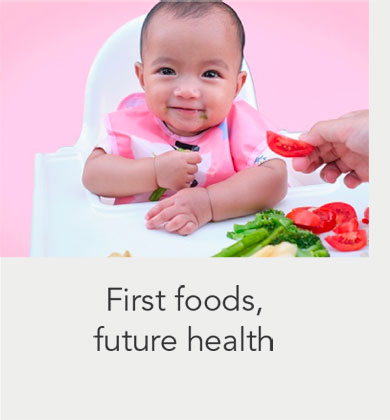
The concept of early nutrition programming is based on the premise that the nutrition a child receives in the first 1,000 days of life will largely determine their future health. If children eat well early on, they will benefit later on. The theory is simple, but the practice can be challenging.
FEED YOUR CHILDREN WELL
The nutrition a child receives during the infant and toddler years will have long-lasting effects on how the body develops and functions, and can also decrease the risk of certain diseases.
Food sources provide the energy for physiological and mental development, including weight, height, brain development, intelligence and so on. They have a direct impact on the health of the child, and the risk of metabolic disorders in childhood and in adulthood.
The most common disorder is obesity. Childhood obesity increases the risk of childhood diabetes, high cholesterol, asthma and even sleep apnoea. These conditions can persist into adulthood, and lead to early heart diseases. An overweight child may be psychologically affected as well. They could be bullied at school and develop low self-esteem.
While you may be tempted to spend extra on organic foods, based on the popular belief that they are nutritionally superior, do remember that an excessive intake of calories will lead to obesity, organic or not.
Breast milk is the undisputed gold standard for infant nutrition. The World Health Organization recommends that mothers exclusively breastfeed their infants until six months of age, after which complementary nutritious foods should be given. But then comes the question of what to give and when to give it.

FIRST FOODS – THE ‘WHAT’
There is no one food that is recommended as a first food. The only hard and fast rule is that first foods should contain ingredients, and be offered one at a time. It is advisable to wait for three days before introducing a new single-ingredient foods, so that any possible allergic reactions can be observed.
Signs of allergic reactions include rash, swelling of the face, tongue or lip, vomiting or diarrhoea, wheezing or shortness of breath. Common food allergens include seafood, eggs and cow’s milk. Popular choices are single-grain infant cereals such as fortified rice cereal and fortified oat cereal, since they are unlikely to trigger an allergic reaction. They should be finely puréed, and contain no additives such as salt or sugar. Other suitable first foods are pureed fruits and vegetables.
FIRST FOODS – THE ‘WHEN’
As to the question of when to introduce solids, age-based guidelines are only approximate, as babies develop at different rates. Your baby will ‘tell’ you when they are ready. The common signs of readiness for solid foods, or weaning, include:
These signs tend to appear at around six months of age, but some babies are ready a little earlier and some a little later.
NEXT FOODS
A couple of months after pureed single ingredients have been introduced, babies typically move on to finger foods, which they can pick up for themselves. Soft pieces of fruit and vegetable and baby toasts and rusks are popular choices.
Of course, common sense should prevail, and small, hard pieces of food that could cause choking, such as nuts, seeds and chunks of hard fruits such as apples, should be strictly avoided.
HOW OFTEN
To encourage a healthy relationship with food and satisfy a child’s growing appetite, the number of mealtimes and snack times should be progressively increased. Here is a general guideline:
By 12 months, babies should be able to participate in family mealtimes and eat a good variety of foods.
FUSSY EATERS
A common lament of many parents is that their toddler is a fussy eater. In fact, fussiness over food may not be cause for concern. Rather than forcing a child to eat, it is better to offer them a variety of food and encourage them to explore new tastes and textures.

WHEN TO SEEK HELP
If your child is failing to meet their developmental milestones, it is time to seek the advice of your doctor or paediatrician. After ruling out possible underlying causes such as gastroesophageal reflux, food intolerance, conditions involving the heart, lungs or endocrine system, or any one of a number of eating problems, they may refer you to a dietitian.
Meanwhile, best of luck in programming your child for a lifetime of healthy eating, and a long and healthy life.
This article is taken from our My Alvernia Magazine Issue #41. Click here to read the issue on our website or on Magzter.